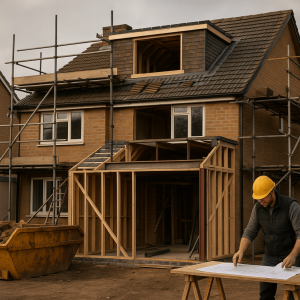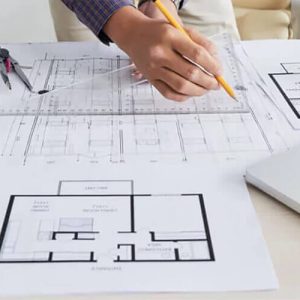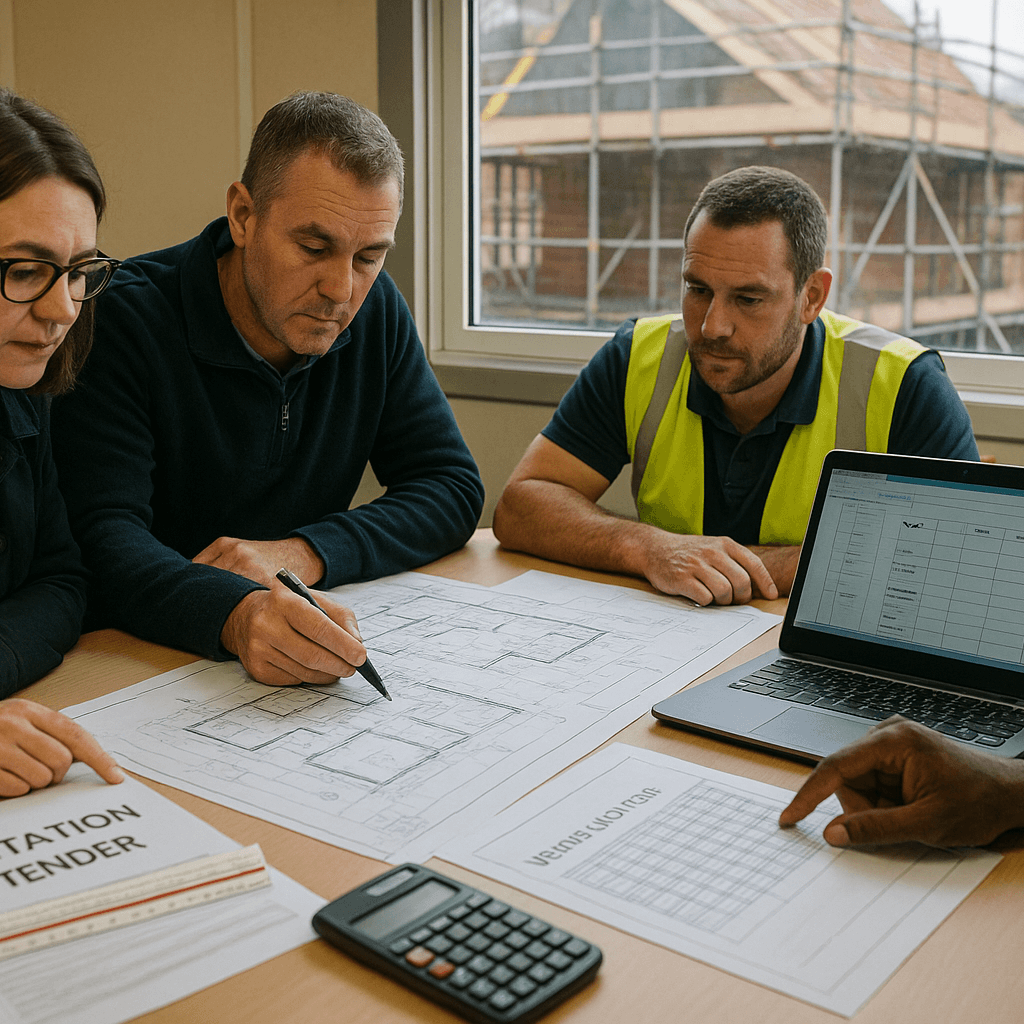Cost Breakdown of Renovating a 3-Bedroom House
For an average UK home (94m²), renovation costs can vary significantly depending on location, contractor rates, and finish level. Below is a typical breakdown of costs for a 3-bedroom home renovation:
Average Renovation Cost by Project Stage
Based on mid-range benchmarks, these are some typical project stage costs for a 3-bedroom house:
- Preliminaries: £51
- Demolitions: £4,043
- Heating and Cooling: £3,324
- Plumbed Appliances: £4,818
- Wired Appliances: £8,242
- Flooring: £13,147
- Units, Worktops, and Kitchen Appliances: £16,384
- Decoration: £15,488
- Fixtures and Fittings: £884
Remember, these are average figures. Actual costs may vary based on material choices, labour rates, and additional custom work.
Renovation Costs by Specification Type
Basic Specification
A basic-spec renovation includes standard finishes and no structural changes. Average costs:
- Low Benchmark: £38,357
- Mid Benchmark: £46,054
- High Benchmark: £50,190
Standard Specification
Standard-spec projects involve mid-range finishes with some additional details, like better flooring and kitchen upgrades:
- Low Benchmark: £53,152
- Mid Benchmark: £58,669
- High Benchmark: £63,810
Premium Specification
Premium specifications feature high-end materials, luxury fixtures, and custom options. Typical costs include:
- Low Benchmark: £74,642
- Mid Benchmark: £82,590
- High Benchmark: £89,878
Additional Costs and Considerations
Planning Permission and Surveys
If structural changes are involved, you may need planning permission and a structural survey, with costs ranging from £500-£1,500 depending on scope.
Temporary Accommodation
For extensive renovations, you might need temporary accommodation, which can add an additional cost depending on location and duration.
Structural Repairs
Older homes often need repairs for issues like subsidence or damp, which could add £5,000-£10,000 to your budget.
Frequently Asked Questions
How long does a typical renovation take?
The timeline for a renovation can vary based on the scale of work, materials availability, and contractor schedules. For a typical 3-bedroom house, a full renovation often takes between 9 and 12 weeks from start to finish. This assumes the project includes tasks like updating flooring, repainting, upgrading the kitchen and bathrooms, and adding new fixtures. If structural changes are involved, such as removing walls or adding rooms, expect an additional 3-6 weeks depending on planning permission, structural work, and building inspections. Here’s a rough breakdown:
- Week 1-3: Planning, sourcing materials, and initial demolitions.
- Week 4-7: Plumbing, electrical work, and initial installations.
- Week 8-10: Finishing work, painting, and installing fixtures.
- Final week(s): Inspections, cleaning, and project sign-off.
Tip: Book tradespeople early and make decisions on fixtures and finishes ahead of time to prevent delays. Custom items or fixtures requiring lead times can often be a source of unexpected delays.
Do I need planning permission to renovate?
For most internal renovations, planning permission is not required. Projects such as repainting, re-flooring, and replacing fixtures are typically within your rights as a homeowner. However, if you plan on making structural changes (e.g., removing or adding walls, adding extensions, or converting attic spaces), you may need to check with your local planning authority. Here are some situations where planning permission may be required:
- Listed buildings or properties in conservation areas: These properties often require permission to maintain their architectural character.
- Extensions and structural changes: Adding an extension, loft conversion, or conservatory that alters the external appearance of the home may need planning approval.
- Major alterations: If you’re changing the number of rooms or creating open-plan layouts, consult with your council as these changes may impact the building’s structural safety and fire compliance.
Tip: Your local council can offer guidance on planning rules for your area. It’s a good idea to review UK government guidelines or consult with a professional if you’re unsure about the requirements.
What’s the difference between renovating and remodelling?
Renovating typically focuses on refreshing or updating an existing space without changing its basic layout or structure. Renovations often include:
- Repainting walls
- Updating flooring
- Replacing fixtures (e.g., kitchen cabinets, sinks, and light fittings)
- Minor repairs or upgrades to existing features
Remodelling, on the other hand, involves altering the structure or function of a space. This may include:
- Changing the layout (e.g., making two rooms into one, or vice versa)
- Moving or adding walls
- Converting spaces (e.g., turning a loft into a bedroom or garage into a home office)
- Adding extensions or new rooms
Remodelling projects are often more complex, require more planning, and can demand both planning permission and building regulations approval.
Tip: Renovating is generally quicker and less expensive than remodelling. If you’re looking to improve the home’s look and feel without a huge investment, a renovation is likely the best option.
Can I live in my home during renovation?
Living in your home during renovations depends on the extent and type of work being done. Cosmetic renovations, such as repainting, replacing flooring, or installing new cabinets, can often be completed room by room, making it easier to stay in the home throughout the process. However, extensive renovations—such as those involving demolition, structural changes, or upgrades to essential utilities like plumbing and electrical—can make daily life challenging or even unsafe.
Here’s a guideline for living arrangements during renovations:
- Stay in place: For light refurbishments, painting, and floor replacements.
- Partial stay: For larger jobs that only affect certain areas (e.g., renovating just the kitchen or bathroom).
- Temporary accommodation: If renovations involve multiple areas at once, or if the work produces heavy dust, noise, and restricted utility access, temporary housing is often the best option.
Tip: Living offsite may slightly increase your costs but can reduce stress and allow contractors to work more efficiently without disruption.
What are typical labour costs?
Labour costs for a renovation can vary depending on the trades involved, the complexity of the project, and regional rates. On average:
- Skilled tradespeople (e.g., plumbers, electricians, and carpenters) charge between £200 and £400 per day.
- Specialist trades such as tilers, plasterers, and decorators typically cost £150 to £250 per day.
- General labourers may cost £120 to £180 per day, depending on experience.
To budget for labour costs effectively, it’s helpful to estimate both the duration and number of tradespeople required. For example, rewiring or extensive plumbing work may require several trades, while painting and decorating might only need a single decorator.
Tip: Obtain at least three quotes from reputable contractors, and ensure each quote includes a breakdown of material and labour costs. This will give you a clearer understanding of where your money is going and help ensure you’re paying a fair rate.
For accurate budgeting, try our cost calculators available here or for a full building estimate for your project, feel free to reach out to us below:












